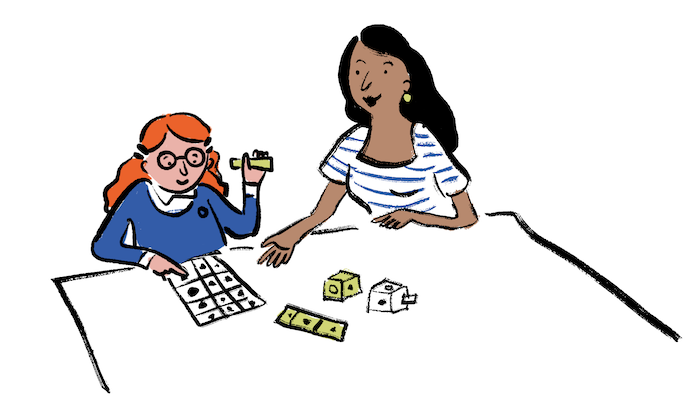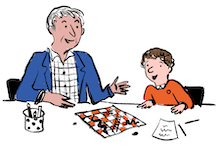‘It has been amazing to watch A- grow in confidence during her maths lessons. When asked to explain different maths problems, she would give her explanation then share with the class that she had learnt that at Number Champions.’
Partner school, Wandsworth

In-School Volunteers
Our trained volunteers help primary school children in London who are struggling with maths. The children are all in School Years 2 and 3 and are aged six to eight.
Volunteers use games and other creative maths activities in one-to-one sessions with the child. This enables the child to gain skills and grow in confidence – and so helps them get the most out of their education.
We work on a school-year cycle, with the volunteer seeing the same child for the full year.
If you’re interested in volunteering with us in a primary school for 1½ hours once a week during the school day, please read on and then email us. We will be delighted to discuss things with you or to send more information.

If there are other ways you’d like to be involved with Number Champions, please see Mentors or Donating or Contact us.

As an In-School Volunteer, you’ll need to be enthusiastic about helping children and also be competent with addition, subtraction, multiplication and division – and to be confident in explaining them.
Before you start in a school, we will provide training, including details of the early-years maths syllabus and creative ways to engage young children with maths.
We have current and former teachers acting as Mentors who deliver this training and offer on-going support to our volunteers. We also deliver training in safeguarding and arrange for DBS background checks for all our volunteers.
In 2023-24 we are partnering with schools in 14 London boroughs, with plans to expand across London in the coming years. So, if we are not yet in an area close to you, we hope that we will be in the medium term.
FAQs

How much time do I need to give as an In-School Volunteer?
A one-to-one session with a child lasts 25 to 30 minutes.
A volunteer typically sees three children in each visit. So, a weekly commitment would be about 1½ hours (plus your travel time). You will also have to do a small amount of preparation for each session and make brief notes for yourself afterwards.
Before you start your volunteering, you will have about seven hours’ training. (Further details are below under ‘What support will I get?’)
We ask you to commit to a full school year to maximise the benefit for the children.
If you apply to Number Champions after the school year has started, we would still love to have you if a vacancy arises – and the commitment would then be for the rest of that school year.
We very much hope that, having completed an initial year, you will wish to continue volunteering with Number Champions!
Can I volunteer if I will be away for a few weeks during term time?
We – and the schools – appreciate that volunteers have their own commitments. So, if you are able to attend for most weeks during the school year and can also give advance notice of your unavailability, you can certainly volunteer and make a positive contribution to each child over the year.
What time are the one-to-one sessions?
Sessions are during the school day, with exact times to be agreed between the school and the volunteer.
Schools usually teach core National Curriculum subjects such as Maths and English in the morning. Therefore, most schools ask for our sessions to be after lunch. However, schools differ, and they will generally try to work with the availability of a volunteer. Schools will want volunteers to commit to coming the same time each week.
Can I choose the school?
We try to match volunteers with schools which are conveniently located for them to travel to. We will arrange for you to visit the school before you start, so that you can meet the senior teacher who acts as our coordinator and who can discuss with you the practicalities of the volunteering.
Where in the school do the sessions take place?
The location will differ by school, and could be, for example, the library or a dedicated corridor area.
For safeguarding purposes, the location must be visible to other people.
The volunteer fetches the child from the classroom at the start of each session and accompanies them back to the classroom afterwards.
How are the children selected?
The teachers at the school select children in Years 2 and 3 who are behind in maths and who they think can benefit from dedicated help.
Our volunteers support children with a wide range of abilities, but they cannot replace the work of a Special Educational Needs professional; we therefore ask schools not to select children needing such professional help.
What support will I get from Number Champions?
Initial training and resources: We will give you about 7 hours’ initial training before you start in school. This consists of reading material and videos followed by an intensive half day in-person session with a small group of other new volunteers. These sessions are run by current and former teachers (‘Mentors’) and are designed to give you the skills and confidence to work with children, to identify their weaknesses in maths, to play relevant games with them, and to deliver simple counting and numeracy activities.
The training includes showing you how to use concrete objects to help a child understand maths concepts. We give you a kit of these resources to take away and use in your sessions with children.
We also supply a condensed version of the National Curriculum for maths, broken down into individual skills for easy understanding. For each skill, we give a link to a resource such as a video or a game which will help you understand how to communicate the skill to the child or how to give the child an opportunity to practise it. We provide this document online, and we periodically update it with additional resources.
Ongoing support: You will be matched with a Mentor. (This will not necessarily be the same Mentor who delivered your initial training). Your Mentor will be available throughout the year to support you by email or telephone, and, if appropriate, face-to-face. They can be like a sort of personal trainer. We encourage our volunteers to contact their Mentor for ideas and support. We also aim to have Mentors host periodic video workshops.
We also organise meet-ups of groups of In-School Volunteers and Mentors so that you can exchange ideas and learn from one another. We are keen to hear what works so that we can pass on ideas to all of the volunteers, including adding the ideas as resources online.
At least once a year, your Mentor will visit you in school to join one of your sessions and offer you feedback or show you techniques to practise. Details will not be passed to Number Champions, although the Mentor will give us an anonymised summary of their school visits.
We also encourage the schools to give you helpful feedback on the progress of the children, and to be available to support you as needed.
What support will I get from the school?
Class teachers generally cannot be available to the volunteer during the school day. We therefore ask schools to put the teachers and volunteers in email contact, so that they can give feedback and ask questions or make requests.
We also have a senior contact in each school (‘Coordinator’), often the Head of Maths. We ask that this senior contact is available to the volunteers. This may be to improve communication with the teachers, but it can also be to give advice such as how to help a child learn a specific skill or how to deal with a behavioural issue.
The school will have a maths scheme of work which details what the children will be learning each week. In many schools this follows a published programme such as White Rose. The school may also have a calculation policy, which shows the method it follows for teaching specific points within the curriculum together with the vocabulary it uses. We ask schools to make these documents available to volunteers, so that they can understand the detail of how the children are being taught and can align their methods and vocabulary with the school’s.
Each child will have a maths workbook, and it may be useful for the volunteer to look at these periodically, to understand where the child is doing well and where he or she needs support.
We ask schools to allow volunteers to sit in on a maths lesson early in the year. This gives the volunteer a real insight into how children learn. A volunteer who feels that they could help the child better with a specific topic by seeing how it is taught in the classroom can also ask to sit in on an appropriate lesson.
Do I have to provide my own materials?
At our training, we will give you a ‘kit’ including whiteboard and pens, dice, counters, cards, snakes and ladders, and laminated sheets with number lines and number squares, etc. Your training will show you how you can engage in various games and activities using such simple materials.
Schools will usually make other teaching tools available, such as toy money and ‘Numicon’. Again, our training will explain how you might use these.
We do not expect you to buy equipment yourself, but for a specific session you might want to bring in items which you have available at home. For example, you might bring a tape measure for a session on measuring lengths and heights.
Will there be other Number Champions volunteers at the same school?
We aim to have at least two volunteers at each school, and most of our partner schools have more. Volunteers may not necessarily be in the school at the same time, so we will introduce the volunteers at a school to each other so that they can share experiences and ideas.
What is your recruitment process?
We will have a brief telephone conversation with you to answer any initial questions, and then we will arrange an interview. Subsequently, we require two identity documents and two reference letters. (We follow up a sample of references by telephone.)
You will need to do our initial training before you can start in a school.
We will organise a DBS check for you which will be done through the school.
Do you pay travel expenses?
We will pay reasonable travel expenses as explained in our Volunteer policy. We encourage all our volunteers to use public transport but we will pay car mileage and even parking costs if there is no reasonable alternative.
How do you know that your intervention has a positive impact?
We have developed our intervention based on discussions with experienced teachers, incorporating ideas from existing literacy schemes in which volunteers support children learning to read. We have also consulted with academics specialising in maths education in primary schools. We continue to refine our intervention based on feedback from In-School Volunteers, Mentors, and schools.
At the end of each school year, we ask the class teacher of each child we work with to evaluate the child’s progress over the year compared to the rest of the class on both confidence and skills. Teachers have consistently rated a very high percentage of children as showing an observable improvement in both categories. For example, in 2022-23, 86% of children showed a measurable increase in confidence with maths, 79% were more engaged in classroom lessons, and 83% showed a measurable catch-up in attainment with the rest of the class. The detailed results are shown in our Annual Reports.
Thus, we have an intervention which professionals predict will succeed and which has shown consistent positive impact. However, we want to continue to improve the quality of our intervention and to get external validation of our results.
We have made initial steps towards establishing a partnership with independent academics who can evaluate whether we achieve improved outcomes for the children we work with. A statistically meaningful analysis will require tracking hundreds of children. Our goal is to achieve this by 2026-27.
